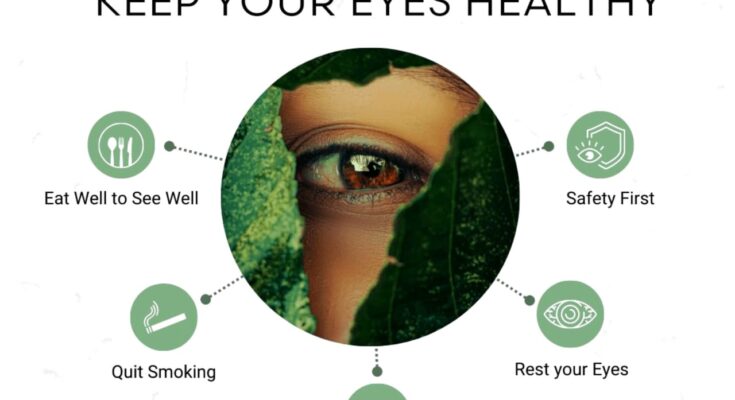Title: Making the most of Your Eye Health: A Comprehensive Guide
Preface:
Welcome to our in-depth eye health guide! As your go-to eye care provider, we recognize the value of having clear vision and good eye health for the duration of your life. Because your eyes are such intricate organs, taking good care of them can greatly improve your quality of life. This post will cover a range of topics related to eye health, from diagnosing common vision issues to offering helpful advice on how to keep your eyes healthy.
Knowing the Vision
One of our most valuable senses is vision, which enables us to see our surroundings. The retina at the back of the eye receives light through the cornea, the lens, and the focus, where it is transformed into electrical signals that
Common Issues with Vision
Power of Motivational Quotes
- Refractive Errors: Refractive errors, which happen when the shape of the eye prevents light from focusing directly on the retina, include nearsightedness (myopia), farsightedness (hyperopia), and astigmatism.
- Age-Related Vision Alterations: Presbyopia is an age-related disorder caused by changes in the anatomy of the eye that results in a less flexible lens, making it harder to concentrate on close objects.
- Eye Diseases: If left untreated, diseases like glaucoma, cataracts, and age-related macular degeneration can have a major negative influence on vision. For the early diagnosis and treatment of these disorders, routine eye exams are essential.
Manage Good Eye Health: 1. Plan Often for Eye Exams:** Regular ocular examinations are necessary to preserve optimal eye health and identify any
- Avoid UV Radiation on Your Eyes: Extended solar radiation exposure raises the risk of cataract development, macular degeneration, and other eye issues. Even on cloudy days, always wear sunglasses that completely filter UV radiation when you’re outside.
- Maintain Proper Eye Hygiene: Always remember to take regular rests for your eyes, particularly if you spend a lot of time in front of a computer or other digital device. Observe the 20-20-20 rule: to lessen eye strain, look at anything 20 feet distant for 20 seconds every 20 minutes.
- Maintain a Healthful Diet: A diet rich in fruits, vegetables, and omega-3 fatty acids that is well-balanced can help prevent age-related macular degeneration and improve eye health. Include foods such as seafood, leafy greens, and
Result:
You may maintain your eyesight for years to come by taking proactive measures to take care of your eyes, which are essential to your general health. Never forget to prioritize getting regular eye checkups, lead a healthy lifestyle, and shield your eyes from harmful environmental elements. We are here to help you on your path to the best possible eye health as your committed eye doctor. Please get in touch and make an appointment if you have any queries or worries regarding your vision. We can work together to protect and improve your priceless gift of sight.
Frequent Ocular Examinations: The Basis of Ocular Health
Having regular eye exams is essential to keeping your vision healthy. Your eye doctor can identify the early warning symptoms of glaucoma and other eye diseases.
Digital Eye Strain: Combatting the Effects of Screen Time
Many of us in the digital age spend a lot of time in front of devices.Prolonged screen exposure can lead to digital eye strain, causing symptoms like dry eyes, headaches, and blurred vision. Learn about the 20-20-20 rule and other strategies to minimize the impact of digital devices on your eyes.
Nutrition for Eye Health: Fueling Your Vision
Just as your body needs proper nutrition, your eyes benefit from a well-balanced diet rich in vitamins and minerals. Discover foods that promote eye health, such as leafy greens, fish high in omega-3 fatty acids, and colorful fruits and vegetables.Personalized recommendations based on your unique requirements can be given by your eye specialist.
Eye Protection: Going Beyond Style
Sunglasses are more than simply a chic accessory—they are an essential tool for shielding your eyes from UV radiation. Find out how important it is to wear UV-blocking sunglasses and safety glasses or goggles when participating in certain activities that could endanger your eyes.
Hygiene Practices: Taking Daily Care of Your Eyes
Even though it’s easy to do, maintaining good eye cleanliness can help avoid infections and pain. Adopting adequate hygiene practices can help maintain long-term eye health. Examples of these practices include washing your hands before touching your eyes and storing and cleaning contact lenses.
Sleep’s Function: Giving Your Eyes a Break for Optimal Performance
For general health, including the health of your eyes, getting enough sleep is crucial. Learn how getting enough sleep can revitalize your eyes and lessen the chance of inflammation, redness, and dryness.
Understanding Your Family History Is Essential for Early Detection
A genetic component is present in many eye disorders. Knowing the medical history of your family’s eye conditions can help you and your eye doctor see potential problems early on. Communicate this information proactively when having your eye test.
How to Keep Your Eyes Healthy
In summary:
Your eye doctor is a partner in your continuous quest to preserve good vision, not just a practitioner you see when something goes wrong. By adopting these suggestions into your daily routine and maintaining contact with your eye.



